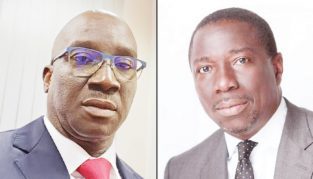The Police Recruitment Board has approved the commencement of screening for successful applicants for recruitment into the constable cadre of the Nigeria Police Force for January 8, 2024.
This followed the meeting of the board on Thursday at the headquarters of the Police Service Commission in Jabi, Abuja where it arrived important decisions in respect of the next stages of the recruitment.
The spokesperson for the PSC, Ikechukwu Ani, made this known in a statement on Thursday.
Ani revealed that at the close of the recruitment portal in December, 416,270 youths were found to have met the initial requirements for the next stage of the exercise, stressing that successful applicants comprise 315,065 General Duty and 101,205 specialist cadre.
Ani said, “The successful candidates are expected to receive their letters of invitation on or before December 23, 2023.
“This next stage of the exercise will include both physical and credentials screening to be conducted in the applicant’s state of origin.
“The Board has further directed that candidates invited for the screening exercise are expected to come with original copies of their certificates and other credentials including letters of attestation from their Local Government Chairmen and/or their traditional rulers.
“Other stages of the recruitment process include computer-based tests which will be held after the screening exercise and Medical examination. Dates for these stages of the exercise will be announced in due course.
“Meanwhile after the closure of the recruitment portal, Kaduna State with 31,117 successful applicants tops the list, followed by Adamawa with 29,848; Benue, 25,346; Borno 24,854; Katsina 24,239 and Bauchi 22,958. Other states with highly successful applicants are Kano, 21,006; Niger, 17,959; Gombe17,493; Yobe, 17,207; Nasarawa, 16,284; Jigawa, 16,007; Taraba, 15,622, Plateau, 15,389 and Kebbi, 12,917.
“Anambra State with 1,141 has the least successful applicants nationwide, followed by Ebonyi, 1,537; Lagos, 1,775 and Abia, 2,110. The Board demands that candidates must conduct themselves in a manner required of Nigerian youths desirous of a career in the Nigeria Police Force, an Institution guided by strict laws and regulations and which holds discipline as a bedrock for its existence.”
The Daily Crucible had earlier reported that youths from south-east Nigeria have consistently shown apathy towards joining the Nigeria Police Force (NPF) in recent years, data shows.
A civic organisation, SBM Intelligence’s data shows that, between 2017 and 2021, the South-East had the lowest representation in recruitment into the Nigerian Police among the nation’s six geo-political zones.
In 2017, among the 5,253 candidates shortlisted for Police recruitment, the North-West had the highest figure of 1,300, the North-Central had 823, the North-East produced 759, and the South-East had the lowest representation with 651. South-South and South-West had 799 and 921 respectively.
In 2018, about 314,877 shortlisted candidates were confirmed. The south-east got only 16,774, the South-South had 32,404, and the South-West contributed 33,359. The North-Central had 78,700, the North-East produced 68,077, and the North-West had 85,563 on the list
According to the data, in 2021, 124,485 candidates were shortlisted, out of which 28,290 were from the North-Central. The North-East had the highest number of shortlisted candidates with 37,522, the North-West 35,585, and the South-South 10,778. South-West had the second lowest with 9,378, while South-East had the lowest with 2,932 candidates.
The consistently low number of youths from the South-East interested in joining the Police has become a worrisome trend in recent years.
The chairman of the Police Service Commission (PSC), Solomon Arase in October 2023, expressed concern about the South-east youths’ persistent lack of enthusiasm in joining the force.
Arase had, in a statement by Ikechukwu Ani, head of press and public relations of PSC, urged the zone’s leaders to figure out how to persuade their youth to show more interest in joining the Force.
The PSC claimed that if the zone continued its apathy in joining the Police, it would be difficult for anyone to pay attention to its complaints of marginalisation in the nation’s Police.
Arase said that as the region was a hotbed for non-state actors’ activities, which fueled insecurity, the youths should have taken the lead in being recruited into the Police and providing indigenous response to the threat.
According to the PSC, the statistics for the 2023 Police recruitment show that Kaduna state leads with 20,259 youths having already completed the online applications, while Adamawa state followed with 18,933 applications.
Others are Borno with 18,305, Bauchi with 16,554, Katsina with 16,232 and Kano with 15,888.
“Next to Anambra state from the rear are Ebonyi, 737; Abia, 966 and Imo, 999. Bayelsa has 1,020; Enugu, 1,036; Lagos, 1,259; Delta, 1,338 Edo; 1,526,” the statement said.
Stakeholders suggest possible reasons for apathy from the region
Commenting on the likely reason for the apathy in Police recruitment from the south-east, a journalist and coordinator of the African Centre for Media & Information Literacy ((AFRICMIL), Chido Onumah, in a chat with The ICIR, said “People who feel exceptionally marginalised do not think the Police could offer them what they need. The Police is also an endangered species in that region of the country,” Onumah stated.
He said nothing represented the oppression faced by youths of the south-east like the Police.
He argued that the youths saw the Police as the authority of the state that supported their oppression.
“There is also the security aspect. The Police in the south-east are the target of terror. In the south-east, Police are very vulnerable, and not many people will fancy such an organisation,” he said.
Also speaking on the issue, a professor of Philosophy at the University of Lagos (UNILAG), Douglas Anene, said many youths, for obvious reasons, “including the longstanding subtle exclusion of Ndigbo (the south-east people) in the commanding heights of security architecture, are not interested in joining the Police.”
He added that “their disillusionment concerning the entire Nigerian project is another reason they are uninterested in joining the Police,” Anene argued.
In his contribution, security expert Oladele Fajana posited that youths from the region preferred engaging in business or salary work (different from policing).
“When the matter came up from the Police Authority, the Police Service Commission was surprised at the number of applicants. The south-east is very minimal compared to other parts of the country.
“It has always been like that. And what are the causes? The love in being in a physical business or salary work,” he said.
Implications for region
In 2023, Frank Mba, the most senior Police officer from the south-east, was promoted three times within a year to fill the region’s vacant position at the higher level.  The Police Service Commission, while explaining the reason for the rapid promotion, said Mba’s rise to a Deputy Inspector General (DIG) of Police three months after he was promoted to the rank of Assistant Inspector-General of Police (AIG) was because he was the most senior Police officer from the south-East zone of the country.
The Police Service Commission, while explaining the reason for the rapid promotion, said Mba’s rise to a Deputy Inspector General (DIG) of Police three months after he was promoted to the rank of Assistant Inspector-General of Police (AIG) was because he was the most senior Police officer from the south-East zone of the country.
DIG Frank Mba, currently the highest serving police officer from the southeast
According to Onumah – mentioned earlier -it would be easier for the south-east to fill the position if they had the numbers.
Speaking on the implication, Fajana said a low representation in the nation’s Police might work against the region in the future.
“Nigeria might still go back to regionalism, whereby every region, every state will protect itself. So it will be challenging for the south-east,” Fajana said.
Possible way out
Suggesting possible solutions to the issue,
Onumah said the Police leadership must find out the cause of the south-east youth’s apathy to joining the Police.
“They can go there and create awareness; they can’t give up. In all of the solutions, it’s for the Police to go there and do a survey, survey the south-east, and find out what the problems are.
“It is the people on the ground that will know best. They should talk to institutions, youths, and parents to find out why people are not joining the Police.
“If they do their research, they can find out if there is a need for incentive. It can serve as a moral booster,” Onumah said.
Proffering a solution, Anene said continuous advocacy by the region’s leaders and non-governmental organisations based in the South-east, including special incentives by the Police Service Commission, could reverse the trend.
Fajana, on his part, said leaders in the region must speak with sincerity to the youths on the matter.
Additional report Credit: Bankole Abe /The ICIR









































